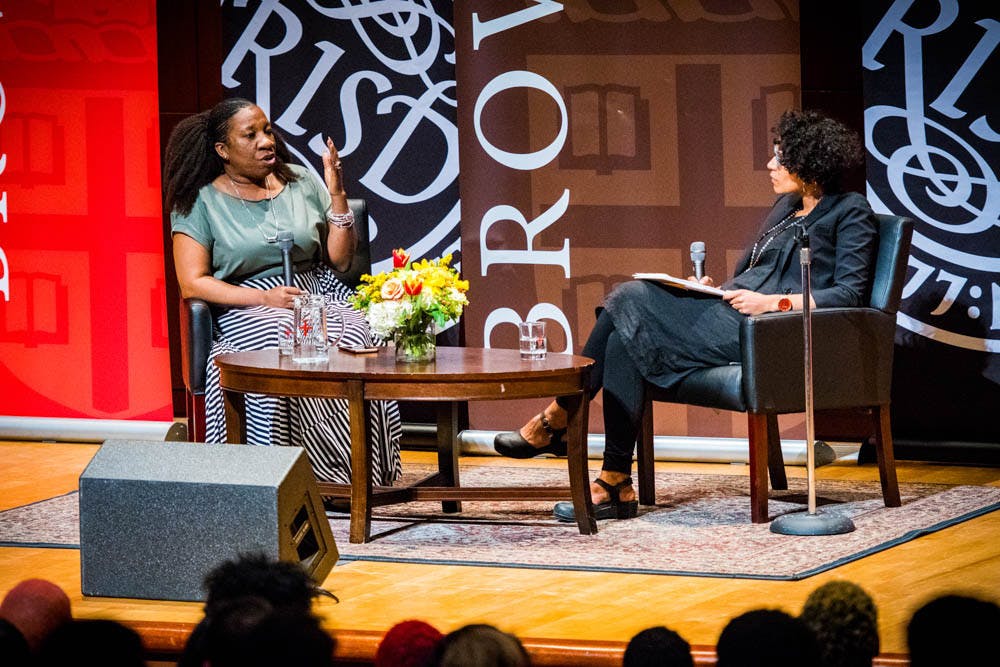“#MeToo is just so simple,” said Tarana Burke, founder and leader of the movement, during an event at the Salomon Center for Teaching Wednesday evening. “It is really just a conversation starter,” Burke said. “Or, (it can be) the whole conversation.”
The discussion on the creation and future of the #MeToo movement, entitled “#MeToo: What’s next in healing and activism, a conversation with movement founder Tarana Burke,” was moderated by Assistant Professor of History Emily Owens, whose area of expertise includes the history of sexuality and slavery, according to her research profile.
The event “was a wonderful success,” Owens told The Herald. “Tarana Burke is an extraordinary human being and a real model of organizing and also just graciousness and delightfulness.”
The #MeToo movement “envisions intersectional survivor-centered solidarity for people of all races, classes, genders and abilities,” according to the event’s website.
“This is a movement that’s about healing,” Burke emphasized. The phrase “comes from a place of trying to connect.”
With over a quarter of a century’s worth of experience as an activist, Burke is also the founder and director of Just Be, Inc., which she created in 2006. Just Be is a “youth organization focused on the health, well being and wholeness of young women of color,” according to its website.
“My heart is the heart of an organizer,” Burke said. She explained how her interest in social justice issues started at a young age. “I had all of this racial pride in my community,” she said, as she discussed her family’s influence on her. Burke’s grandfather, for example, gave her the book “They Came Before Columbus” when she began learning about slavery in school, and she had access to her mother’s personal library full of literature by authors like Toni Morrison and Maya Angelou.
Burke realized she wanted to be an “organizer” in 1989 when she became involved with the 21st Century Youth Leadership Movement’s response to the racially-charged Central Park jogger case. Donald Trump, who Burke later referred to as the “orange cloud,” bought full-page ads in several newspapers to reinstate the death policy in New York State in light of the case, according to a Guardian article. Burke called Trump’s involvement in that situation, and his current activity, a full-circle.
Burke also emphasized the importance of “the system” when discussing the many recent high-profile sexual assault allegations and potential solutions. “A person like Harvey Weinstein doesn’t exist in a vacuum,” she said.
Audience member Heidy Santos-Valencia ’19 appreciated Burke’s emphasis on the importance of regular and continual work in order to make social movements successful. Movements are “a constant thing,” Santos-Valencia said.
Despite receiving hate mail and death threats, Burke stressed the importance of continuing her work. “It is worth the risk because I don’t know if I’ll have this opportunity again.”
“The visibility is something I’m trying to navigate,” Burke said when discussing her rise to fame. Up until recently, she said she had been largely “behind the scene.”
Laura Costa, who is on the board of the Rhode Island chapter for the National Organization for Women, attended the lecture. “I’m always looking for other people’s perspective on things, especially people who are different from me in a number of ways,” she said. “It’s a topic that is both personal and professional for me.”
Throughout the event, Burke spoke about the importance of younger generations to the movement, and discussed the ways in which they inspire her. “I really like to talk to young people directly on the campus,” she said, adding that it is significant to her to try to “help young people navigate how to respond to the movement.”
Burke said that it’s “still really difficult to have community-based conversations about these issues.” Activists must address how to take “this wonderful dialogue (occurring in academia) and bring it to the community.”
“There’s so much curiosity on this campus and there’s so much desire for change,” Owens told The Herald. “I think (Burke) has deep wisdom and experience and she shared that with us in often really concrete and specific ways.”
The lecture was co-hosted by the University and the Rhode Island School of Design. Sponsors included the Brown University Office of BWell Health Promotion, Office of Campus Life and Student Services, Watson Institute, Office of Institutional Diversity Equity and Inclusion, Office of Residential Life, Sarah Doyle Women’s Center, Pembroke Center for Teaching and Research on Women and the Center for the Study of Race and Ethnicity in America, according to the event’s website.





